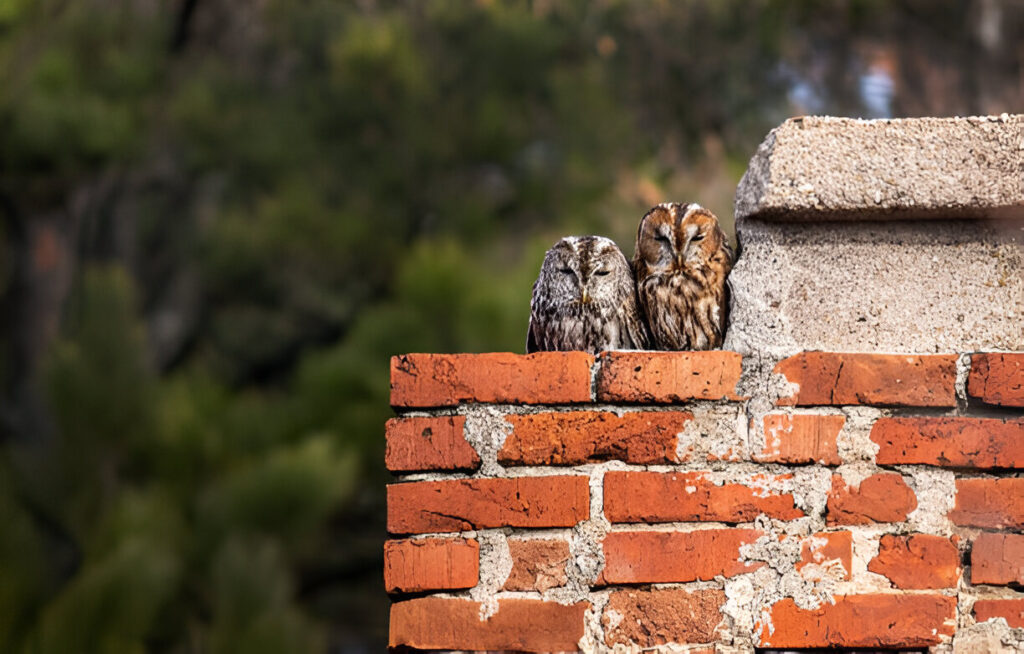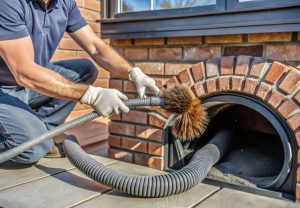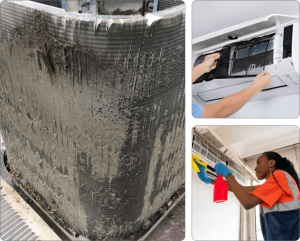Chimneys are more than just a path for smoke. Over time, they become homes for many small creatures. When the weather shifts, animals look for warmth and safety. A chimney looks like the perfect spot. Birds, squirrels, and even raccoons sneak in. While this may seem harmless, it can cause trouble for homeowners.
If you live in New Jersey, you know how seasons change fast. Cold winters and mild springs push animals to search for shelter. That’s why chimney cleaning in New Jersey is important. It helps clear soot and keep pests out.
In this blog, we will be discussing the seasonal pests that get inside the chimney, the danger they bring, and how to prevent them from nesting inside.
Why Animals Love Chimneys
Chimneys are tall, dark, and quiet. To a bird or squirrel, this feels safe. No rain, no strong wind, and fewer predators. A chimney is like a hollow tree, which animals use in the wild. The problem? Chimneys are not trees. Once animals move in, they block airflow, damage parts, and may bring health risks.
Some reasons animals use chimneys:
- Warmth during winter
- A safe nesting spot in spring
- Shelter from storms
- A hidden area away from predators
Which Pests Sneak Inside The Chimney?
Birds in Chimneys
Birds are one of the top chimney squatters. In New Jersey, chimney swifts are often the culprits. These birds are small and dark. They are known for their high-pitched chirps and quick flights.
Why Birds Enter Chimneys
- Chimneys feel like hollow trees.
- Safe from cats and hawks.
- Perfect place to build a nest.
Risks From Birds
Birds may seem harmless, but their nests are not.
- Blockages: Nests can block smoke. This can push carbon monoxide back into the home.
- Fire Hazards: Dry twigs and leaves can catch fire when the fireplace is lit.
- Noise: Chirping and flapping can disturb sleep.
- Health: Bird droppings may carry bacteria and fungi.
Signs of Birds in Chimneys
- Chirping sounds inside the walls or chimney.
- Twigs or feathers falling into the fireplace.
- Strong odor from droppings.
Squirrels in Chimneys
Squirrels are curious and crafty. They climb with ease and love high spots. In spring, mother squirrels look for safe places to raise babies. Chimneys are just right for them.
Why Squirrels Use Chimneys
- Safe, dark shelter for newborns.
- Warmth during cool nights.
- Hidden from foxes, owls, and other threats.
Risks From Squirrels
- Chewing Damage: Squirrels chew wires, wood, and chimney parts.
- Blockages: Leaves and bedding clog airflow.
- Fire Risks: Nesting material may ignite.
- Escape Trouble: Some squirrels fall in and can’t climb out. They may die inside, creating odor and sanitation issues.
Signs of Squirrels in Chimneys
- Scratching and scurrying sounds.
- Nuts, leaves, or debris falling down.
- Strong smell if one gets stuck and cannot escape.
Raccoons in Chimneys
Raccoons are larger, stronger, and harder to remove. They see chimneys as dens. A female raccoon may choose a chimney to raise her kits in spring.
Why Raccoons Love Chimneys
- Warm, dark shelter.
- Height offers safety.
- Easy entry if there’s no chimney cap.
Risks From Raccoons
- Aggression: A raccoon in a chimney can be dangerous to approach.
- Damage: They can claw at chimney liners.
- Health Hazards: Raccoon droppings may contain parasites.
- Noise: Loud thumping and growling may echo in the chimney.
Signs of Raccoons in Chimneys
- Heavy thuds or growls inside.
- Strong foul odor.
- Scratches around the top of the chimney.
Seasonal Patterns of Chimney Pests
Each season brings different risks. Knowing the cycle helps homeowners plan ahead.
Winter
- Animals seek warmth.
- Birds migrate, but some stay.
- Squirrels may use chimneys for shelter from cold winds.
Spring
- Peak nesting season.
- Birds build nests in chimneys.
- Squirrels and raccoons raise young.
Summer
- Chimneys are less used.
- Animals still seek cool, shaded shelters.
- Nesting debris may sit inside, creating blockages.
Fall
- Animals prepare for winter.
- Squirrels may store nuts in chimneys.
- Birds may look for spots before migrating.
This cycle shows why prevention and routine care are vital.
Dangers of Animal Nests in Chimneys
Many think, “It’s just a nest. How bad could it be?” The truth is, nests can cause severe problems.
Fire Hazards
Dry twigs, leaves, and paper can ignite. A small spark can lead to a fire inside the chimney.
Carbon Monoxide Poisoning
A blocked flue traps smoke. Invisible carbon monoxide may spread into living rooms and bedrooms.
Odors
Dead animals or droppings create strong smells. This odor can spread through vents.
Health Issues
- Bird droppings may carry histoplasmosis.
- Raccoon droppings can contain roundworms.
- Squirrels may bring fleas or ticks.
Structural Damage
Chewing, scratching, or moisture buildup weakens parts of the chimney. Repairs can cost thousands.
Also Read: Why is Chimney Cleaning Important for Home Safety?
How to Prevent Pests Nesting in Chimneys
Prevention is always easier than removal. Once animals settle in, it gets messy. Here are smart ways to stop pests before they move in.
Install a Chimney Cap
A chimney cap is the single most effective defense. Without one, your chimney is wide open, like leaving a door unlocked in the middle of the night. Birds fly straight down, squirrels leap across from nearby trees, and raccoons climb right in. A cap closes that entry point. Most are made of durable metal and fitted with mesh sides that allow smoke to rise while keeping animals, leaves, and rainwater out. The added bonus is that a cap also protects against moisture. Rain and snow slipping into an open chimney can weaken bricks and mortar over time, leading to costly repairs. By installing a chimney cap, you solve both pest problems and weather damage in one simple step.
Annual Chimney Cleaning
Even with a cap, debris and soot still build up inside. Old nests from past seasons may sit unnoticed until they block airflow or cause odors. That’s why yearly cleaning is so important. Professionals use brushes and vacuums to clear every corner of the flue, remove hidden nests, and make sure gases can escape safely. If you live in the region, booking chimney cleaning in New Jersey before winter gives you peace of mind. Local experts know which pests are most active in each season, and they can catch problems before they grow. An annual cleaning also acts like a checkup, if animals have been inside, you’ll know about it right away.
Seal Cracks and Openings
Animals are experts at squeezing through the smallest gaps. A missing mortar joint, a loose brick, or a damaged damper is all it takes. Squirrels, in particular, are known for forcing their way through tiny openings. Raccoons, with their strong paws, can pry at weak spots until they break through. Sealing cracks and openings keeps these determined creatures out. Repairs may seem minor now, but they prevent bigger issues later. Think of it as locking your house at night, you wouldn’t leave a window open, and you shouldn’t leave gaps in your chimney either.
Trim Nearby Trees
Trees that hang over the roof give pests an easy route. Squirrels leap across branches, raccoons climb up, and even some birds prefer to land on a branch before hopping to the chimney top. Trimming back trees removes this “ladder” to your roof. It also helps protect shingles and gutters from falling branches during storms. A clear roofline makes it harder for animals to even reach your chimney, which means fewer chances for them to try sneaking in.
Noise and Light Deterrents
Some homeowners add extra protection by using deterrents. Bright lights placed near the top of the chimney or ultrasonic sound devices can make animals think twice about moving in. These tricks often work best during early spring when pests are scouting for nesting spots. While they are not foolproof, they can buy you time until you schedule a professional cleaning or repair. Animals are persistent, and most will eventually return if the chimney is left unprotected, but as part of a larger prevention plan, deterrents can help.
Keep Fireplaces Active
An unused chimney looks quiet and safe to animals. Lighting a fire every so often reminds them that this is not a hollow tree but an active, smoky space. The warmth, sound, and smell of burning wood are enough to discourage most birds and squirrels from settling in. You don’t need to keep the fire going constantly. Just using the fireplace during cold snaps can make your chimney far less appealing. Combined with caps, cleaning, and sealing, this final step helps keep your chimney pest-free through every season.
What to Do If Animals Are Already Inside
If you suspect animals, do not light a fire. This could harm or kill them and worsen the problem. Instead:
Listen and Observe
Note the type of sound. Chirps mean birds. Scratching may mean squirrels. Heavy thuds suggest raccoons.
Call a Professional
Wildlife control experts and chimney sweeps can remove animals safely. In New Jersey, many chimney companies offer removal as part of their services.
Do Not Try DIY Removal
- Birds like chimney swifts are protected by law. You cannot remove them during nesting season.
- Raccoons may be aggressive and carry rabies.
- Squirrels may bite if cornered.
Clean After Removal
A professional should clean out the chimney. Droppings, parasites, and nesting material must be cleared to restore safe airflow.
Why Professional Chimney Cleaning Matters
You may wonder, “Can’t I just do this myself?” Climbing a roof and looking into a chimney may seem simple. But chimney cleaning and pest removal are risky.
Professionals use proper tools. They sweep, vacuum, and check for damage. They also know local laws about protected birds. Most importantly, they spot early warning signs before you even notice.
If you live in New Jersey, finding a trusted service is easy. Many families already schedule chimney cleaning in New Jersey every fall. This keeps their homes safe for winter and keeps pests away.
Seasonal Checklist for Chimney Care
Here’s a simple checklist to follow throughout the year:
Winter
- Keep fires small until you’re sure the flue is clear.
- Watch for smoke backing up.
Spring
- Inspect for chirping or scratching.
- Schedule chimney cleaning.
Summer
- Install or repair chimney caps.
- Trim nearby tree branches.
Fall
- Book professional chimney cleaning in New Jersey before the first fire.
- Inspect for cracks or leaks.
Also Read: What Causes Chimney Cracks and How to Fix Them
Pests In Your Chimney? Book Chimney Cleaning in New Jersey With Alpha Clean Air
Have you noticed strange noises coming from your chimney? Maybe the birds, squirrels, or raccoons have sneaked inside without you knowing.
Oops! Now what?
You need chimney cleaning services now. At Alpha Clean Air, we offer detailed chimney sweep services designed to remove all pests. Our professionals clear all the hidden blockages while restoring airflow. We prepare your chimney for use, allowing you to enjoy the warmth of your furnace without the irritation of scratching noises and unpleasant smells.
Call us now and schedule an appointment.





